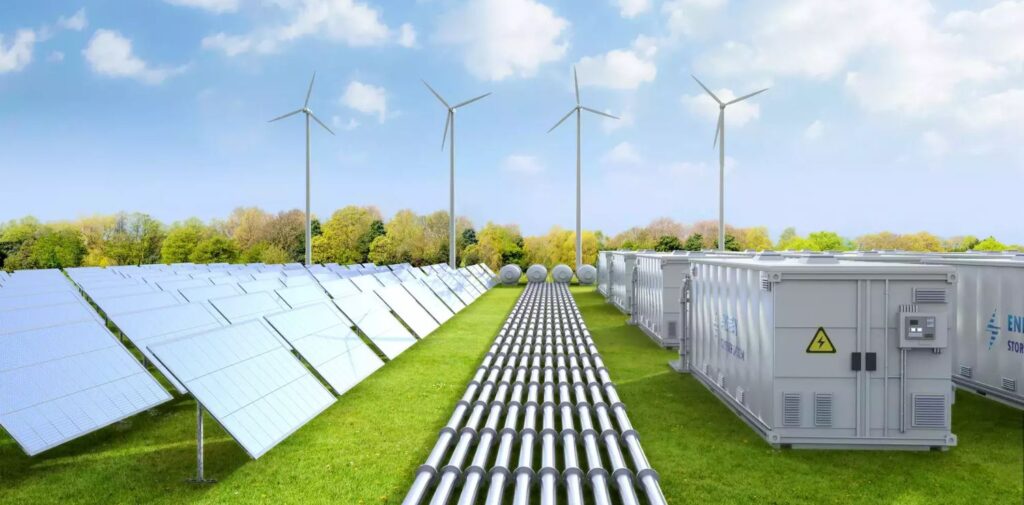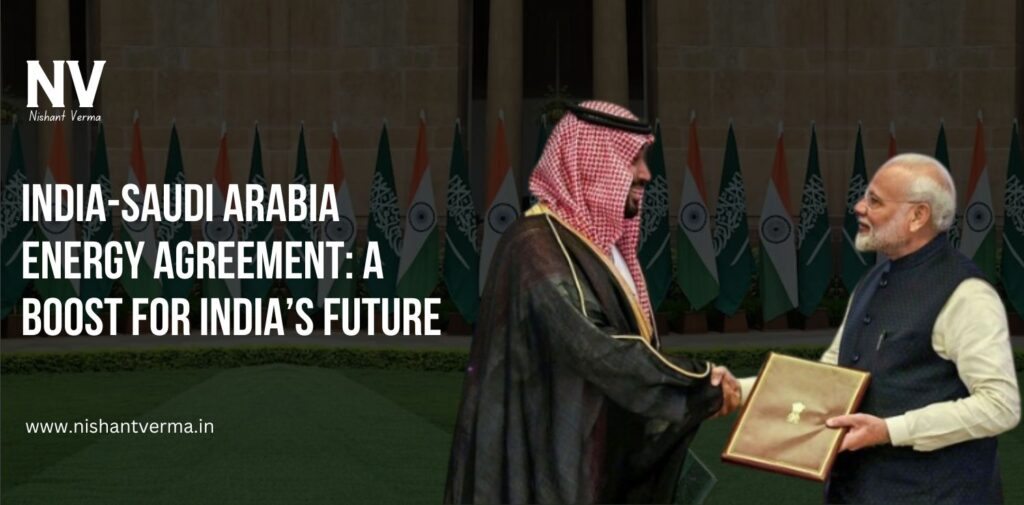In September 2023, India and Saudi Arabia signed a landmark agreement to enhance cooperation in the energy sector. This agreement was inked during the first meeting of the India-Saudi Strategic Partnership Council in New Delhi, marking a pivotal step in energy collaboration between the two nations. With the global energy landscape undergoing a significant shift towards sustainability and reduced carbon emissions, this partnership promises far-reaching benefits for India, particularly in terms of energy security, technology transfer, and economic development.
Diversification of India’s Energy Sources
India is heavily dependent on imports for its energy needs, particularly oil and gas. Saudi Arabia has been a major supplier of crude oil to India, but this agreement goes beyond traditional oil trade. It focuses on diversifying India’s energy basket by including renewable energy sources like solar and wind, hydrogen, and energy storage systems. This is crucial as India seeks to reduce its dependence on fossil fuels and transition towards cleaner energy alternatives.
The agreement covers key areas such as renewable energy, hydrogen, energy efficiency, and electricity grid interconnections. These components will enable India to explore alternative energy solutions, ensuring a stable supply of energy while reducing carbon emissions. Saudi Arabia’s advanced research in hydrogen fuel and its investments in solar energy align well with India’s ambitious goals under the National Hydrogen Mission and the International Solar Alliance. This will not only diversify India’s energy sources but also contribute to its long-term energy security.
Strategic Petroleum Reserves and Energy Security
Energy security is a critical concern for India due to its growing energy consumption and dependence on imports. The agreement with Saudi Arabia emphasizes the development of strategic petroleum reserves, which will act as a buffer against supply disruptions. By collaborating with Saudi Arabia, one of the world’s largest oil producers, India can ensure a reliable supply of crude oil, even during geopolitical uncertainties or market volatility.

This collaboration also includes provisions for enhancing cooperation in natural gas and electricity. Saudi Arabia’s vast resources and India’s growing demand for energy create a symbiotic relationship, wherein Saudi investments in Indian energy infrastructure could help stabilize the Indian energy market.
Promoting Investments in Renewable Energy
A significant aspect of the agreement is encouraging bilateral investments in renewable energy. Both nations are focusing on reducing their carbon footprints, and investments in solar, wind, hydrogen, and energy storage technologies are at the forefront of this initiative. This collaboration aligns with India’s renewable energy goals of achieving 500 GW of non-fossil fuel-based energy capacity by 2030.

Saudi Arabia’s expertise in circular economy technologies, particularly in carbon capture, utilization, and storage (CCUS), can significantly aid India in its battle against climate change. The circular economy approach will help India transition from a linear, wasteful energy model to a more sustainable one that reuses and recycles materials. By investing in these cutting-edge technologies, India can mitigate the effects of climate change while fostering innovation in its energy sector.
Enhancing Technological Cooperation and Innovation
The agreement also opens doors for digital transformation in the energy sector, with a focus on innovation, cybersecurity, and artificial intelligence (AI). Saudi Arabia has been investing in advanced technologies that enhance energy efficiency, and through this partnership, India can benefit from knowledge-sharing and technological collaboration.
The integration of AI and digital technologies in the energy sector can revolutionize how energy is produced, distributed, and consumed in India. For example, AI-driven solutions can optimize energy consumption patterns, reduce wastage, and increase grid reliability. In addition, cybersecurity measures are crucial as India’s energy infrastructure becomes more digitized, and collaboration with Saudi Arabia can help safeguard critical energy systems.
Economic Growth and Job Creation
The energy partnership is poised to bring substantial economic benefits to India. The influx of Saudi investments in India’s energy infrastructure, particularly in renewable energy projects, will create jobs and boost economic growth. Moreover, localization efforts, wherein materials and services related to energy technologies are manufactured domestically, will further stimulate India’s economy by developing local industries.

In particular, investments in hydrogen production, solar energy projects, and energy storage systems will create a new wave of job opportunities across various sectors, including engineering, construction, and research and development. This partnership aligns with India’s broader goal of becoming a global leader in the green energy transition, while also addressing its domestic employment needs.
Conclusion: A Win-Win Partnership
The India-Saudi Arabia energy agreement is a comprehensive and forward-looking pact that offers immense benefits for India. By fostering cooperation in renewable energy, energy security, technological innovation, and economic growth, the agreement sets the stage for a more sustainable and secure energy future for India. It will help India diversify its energy sources, reduce carbon emissions, and create new economic opportunities. In the long term, this partnership will play a critical role in shaping India’s energy transition and positioning the country as a leader in the global shift towards clean energy.




